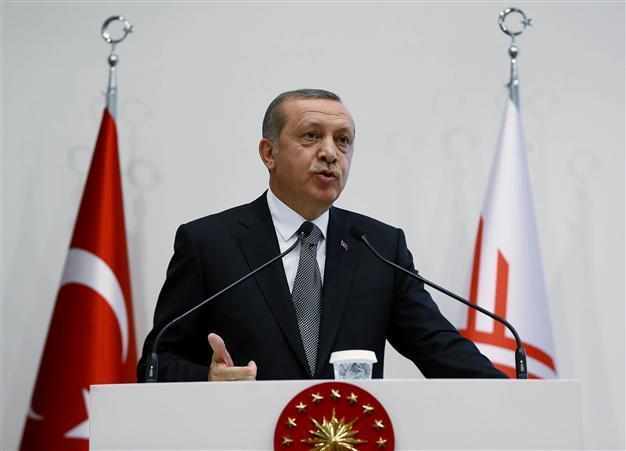Turkish President Erdoğan meets Central Bank governor to keep up 'trust' in economy
ANKARA

AA Photo
Turkish President Recep Tayyip Erdoğan on late March 11 met with the country’s economy czar and Central Bank head, agreeing on a strong need to build trust in the economy as well as to ease markets after a plunge in the value of the Turkish Lira against the U.S. dollar.
The lira, which had already slightly recovered on March 11 by a steep decrease in the current account deficit, slid to 2.59 against the dollar after the meeting in the morning March 12, compared with almost 2.65 on March 6.
Erdoğan hosted Deputy Prime Minister Ali Babacan and Central Bank Gov. Erdem Başçı at his presidential palace in Ankara in an attempt to end the apparent controversies and disagreements with them over monetary policy.
At the meeting, Başçı made a 130-page presentation on “restoring confidence to the economy and limiting public debt,” according to the Anadolu Agency.
After Başçı left the presidential office, Babacan stayed on for another half-hour of talks with Erdoğan, sources familiar with the issue said.
No press conference was held after the meeting, but the presidential office issued a statement which said the “president’s sensitivity about rates and production were emphasized” and “the current environment of confidence and stability should be meticulously maintained.”
Başçı’s entire presentation was uploaded to the official website of the Central Bank just after the meeting.
Important details about the latest developments both in the Turkish economy and the global economy were seen on the presentation’s slides. The slides appeared to show Başçı had attempted to give Erdoğan a detailed brief in economic theory, showing the relationship of inflation to interest rates and its effects on Turkey’s economic performance.
The Central Bank cut its main interest rate slightly in January and February, but drew heavy criticism from Erdoğan and government ministers, who said more rate cuts were needed to support economic growth just ahead the parliamentary elections in June.
The bank said its first duty is to maintain price stability, so it will preserve its current monetary policies until inflation further decreases, particularly with inflation running well above the bank’s 5 percent target.
Erdoğan and several ministers supported the idea that higher rates cause higher inflation, and the country couldn’t grow faster now due to the high interest rates.
After these heated discussions, the negative trend for the lira began, and the currency was down around 12 percent against the dollar this year.
Turkey relies on foreign capital inflows to finance the deficit, its main economic vulnerability, particularly when overseas investors pull back.
“As we speak we have been taking profit quite actively in the run-up to the elections and political temperatures have risen,” said Emerging Markets Senior Portfolio Manager at Wells Fargo Asset Management Anthony Cragg, as quoted by Reuters.
“The concern out there, which is not unique to us, is of government interference particularly in monetary policy. It looks like the president is leaning on the Central Bank to cut rates at a time when they should not be cutting,” he said. “For now, that’s enough to worry investors.”
According to Başçı‘s presentation slides, he also showed how high Turkey’s 10-year bond yields are.
The related slide indicates Turkey came second after Brazil with the highest bond yields. In Brazil, the rates are high mainly due to the high inflation rate and high budget deficit in the country, and in Turkey mainly due to the high inflation rates.
Thus, Başçı said the higher inflation rates are, the higher the interest rates are.
Başçı also showed why rates are near zero or below zero in several developed countries in response to Erdoğan’s previous remarks, claiming “the current global conjuncture is for lower rates.”
The slides indicated that interest rates are very low in the eurozone and the U.S. because the inflation rates are very low there.
The presentation ended with several comments about the conditions under which interest rates could be cut. Rates could be cut gradually if overall stability is endured, fiscal discipline and a monetary policy focusing on price stability are maintained, and the inflation rate is decreased so as to lower the risk premiums.
Başçı, Prime Minister Ahmet Davutoğlu and cabinet ministers held an eight-hour meeting on the economy on March 10, after which the government promised measures to boost industrial production and employment as it seeks to accelerate growth.
In a statement it also stressed the independence of the Central Bank.
